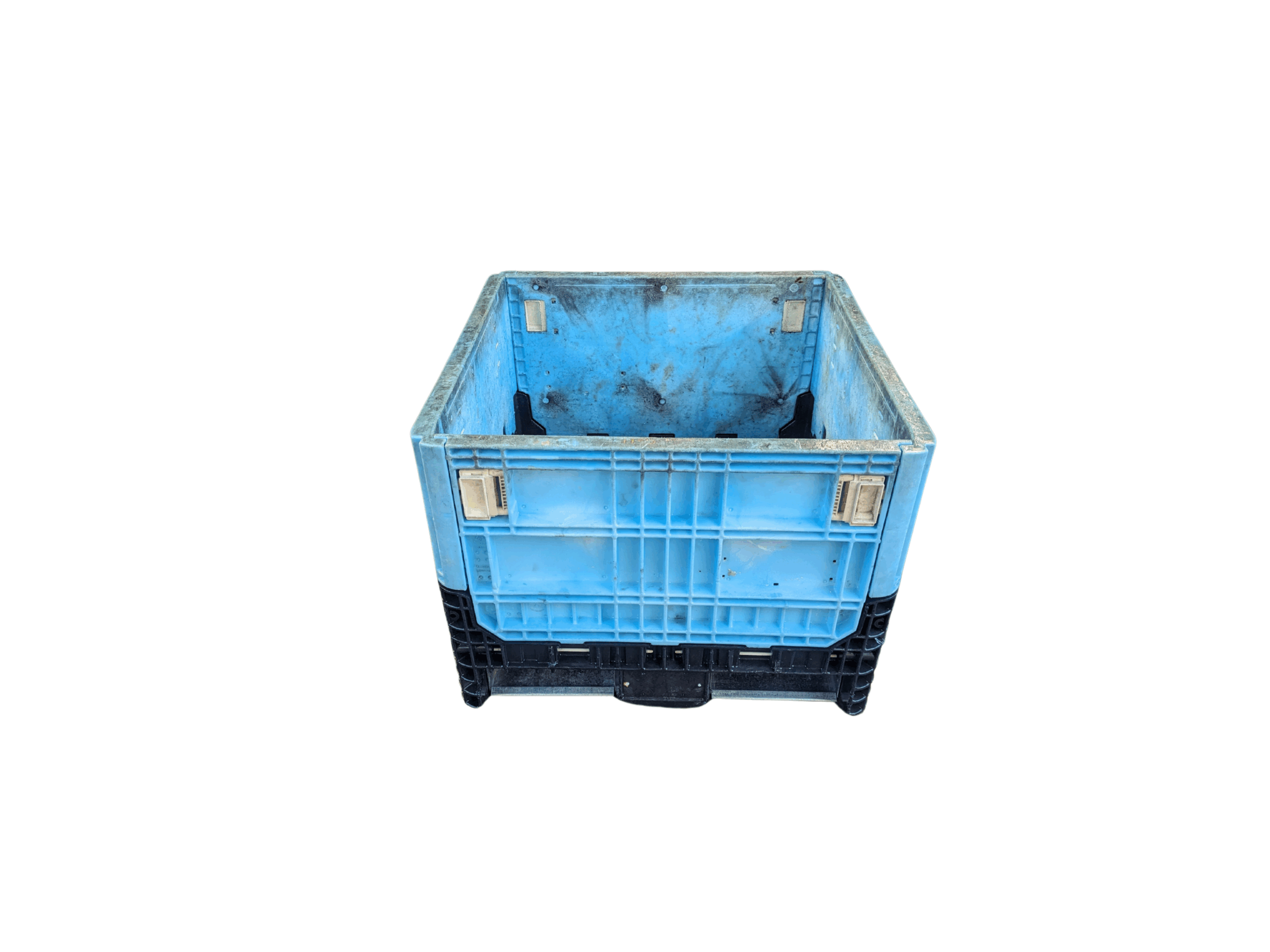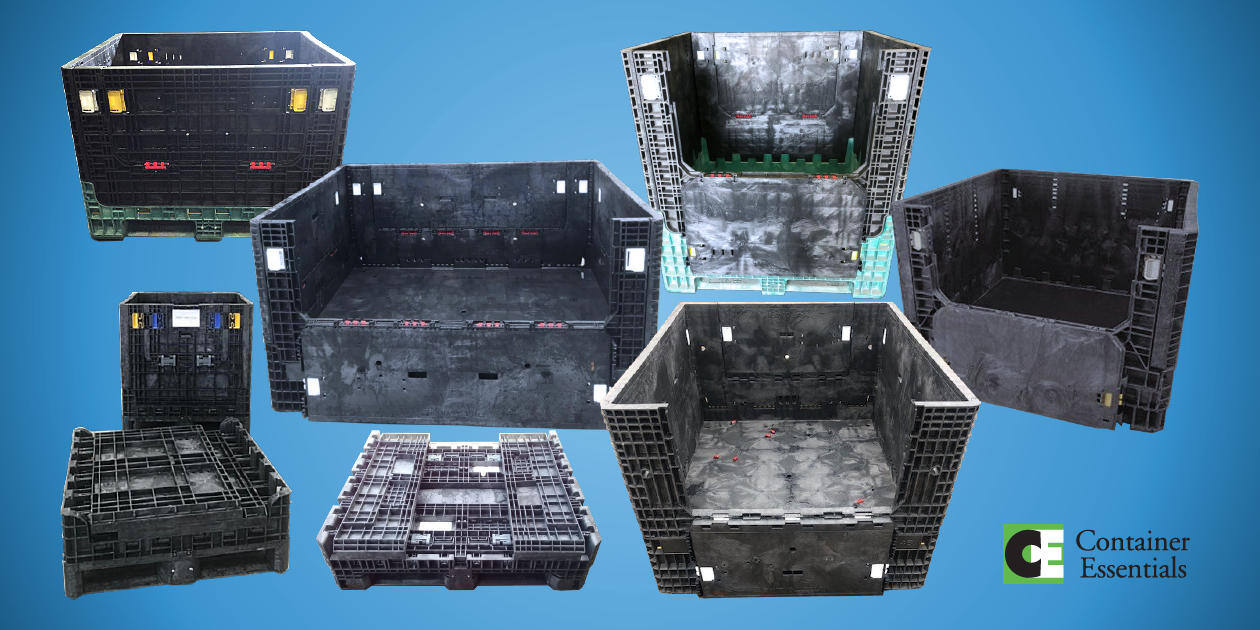The Ultimate Guide to Selecting the Right Bulk Containers for Your Business Demands
Selecting the appropriate bulk containers is critical for any kind of service that depends on efficient logistics. Different kinds of containers exist, each created for particular products and applications. Aspects such as size, product compatibility, and regulative standards play a substantial duty in this decision-making procedure. Recognizing these elements can lead to boosted functional effectiveness. Nevertheless, many businesses forget important elements that might boost their total efficiency and sustainability. What are these factors to consider?
Understanding Various Types of Bulk Containers
Bulk containers serve as vital tools for services looking for effective storage space and transport remedies. These containers can be found in numerous kinds, each designed to fulfill particular operational requirements. One typical kind is the intermediate mass container (IBC), which is excellent for granulated and fluid materials, supplying an equilibrium of capability and maneuverability. One more popular option is the mass bag, or FIBC, suitable for completely dry, flowable items. These adaptable containers are light-weight and can be quickly delivered and stored. For much heavier materials, stiff mass containers are frequently employed, providing longevity and stability for secure handling. In addition, there are specialized containers tailored for dangerous materials, making certain compliance with security policies. Recognizing the distinct features of these mass container types allows organizations to make enlightened choices that maximize logistics and lower expenses. By picking the best container, firms can enhance their functional performance and improve their supply chain procedures.
Secret Material Factors To Consider for Mass Containers
When selecting mass containers, it is vital to consider the products used in their building. Elements such as chemical, longevity, and stamina compatibility play a crucial role in making certain the containers meet details operational needs. Additionally, weight and transportability issues can influence both effectiveness and transport logistics.
Material Longevity and Stamina
Resilience and strength are critical factors in choosing materials for mass containers, as they directly influence the container's capacity to hold up against numerous environmental problems and managing procedures. Materials such as high-density polyethylene (HDPE), polypropylene, and stainless-steel are frequently preferred for their robust buildings, supplying resistance to temperature level, impact, and abrasion changes. The option of product additionally impacts the overall life expectancy of the container; more powerful materials commonly cause less constant substitutes, leading to set you back financial savings in time. Furthermore, the weight of the product can affect shipping expenses and simplicity of handling. Businesses have to consider their specific functional settings and the capacity for damage to ensure peak toughness and toughness in their mass container option.
Chemical Compatibility Aspects
Recognizing chemical compatibility is vital for selecting mass containers, as the materials made use of should withstand the certain substances they will certainly hold. Various variables influence compatibility, consisting of the chemical nature of the materials, temperature, and period of storage. For instance, corrosive chemicals might need containers made from stainless steel or specialized plastics that stand up to degradation. Furthermore, reactive compounds can produce warm or gases, requiring aired vent or pressure-rated containers. The choice of container product, whether polycarbonate, polyethylene, or metal, must line up with the chemical homes of the kept compounds to avoid violations or leakages. Eventually, a comprehensive analysis of these compatibility elements guarantees secure handling and storage space, securing both personnel and the environment while preserving item integrity.
Weight and Transportability Concerns
Picking bulk containers involves not only assessing chemical compatibility however also considering weight and portability. Services should evaluate the ease of handling and transport to enhance efficiency. Light-weight products like high-density polyethylene (HDPE) or light weight aluminum can help with much easier activity and lower delivery costs. Alternatively, larger containers might offer boosted longevity however can impede flexibility, particularly in atmospheres requiring frequent moving. Additionally, the design of the container need to permit convenient lifting and stacking, ensuring ergonomic safety for workers. Firms need to likewise think about the infrastructure available for transportation; as an example, containers compatible with forklifts or pallet jacks can simplify procedures. Ultimately, the right balance in between weight and portability directly affects operational performance and cost effectiveness.
Sizing Your Bulk Containers for Optimal Effectiveness
When sizing mass containers, companies have to thoroughly analyze the dimensions called for to fit their specific items. In addition, weight ability is a vital element that influences effectiveness and security throughout transport and storage. Efficient sizing not just makes the most of room however likewise enhances functional operations.
Identifying Container Capacities
Picking the ideal dimensions for mass containers is essential for making best use of effectiveness in storage space and transportation. Companies have to evaluate their details demands, considering factors such as readily available area, the this contact form nature of the products being kept, and the over here techniques of transport used. Precise measurements ensure that containers fit ideally in storage facilities and cars, lessening wasted space and lowering managing time. Standard sizes can provide convenience, yet personalized dimensions may be necessary for distinct requirements or to suit particular products. In addition, it is necessary to review piling capabilities and access, as these factors affect total functional effectiveness. Inevitably, the ideal measurements cause boosted organization and structured logistics, benefiting the total productivity of the business.
Weight Capacity Considerations
Recognizing weight capacity is crucial for services intending to optimize their mass container effectiveness. The weight ability of a container straight impacts storage capabilities, transportation logistics, and overall functional expenses. Selecting containers with the suitable weight limits ensures that organizations can securely keep and move their products without running the risk of damages or compliance concerns. Overloading containers can lead to architectural failings, while underutilizing ability lead to thrown away resources. When picking containers, it is crucial for organizations to assess their item weights and consider any kind of regulative needs. Additionally, factors such as the sort of material, meant usage, and ecological conditions need to additionally affect weight ability choices. By examining these elements, services can improve performance and assure a structured supply chain.
Governing Conformity and Safety Standards

Governing compliance and safety and security requirements play a crucial role in the option of bulk containers for companies. Organizations needs to assure that their containers fulfill numerous guidelines established by local, nationwide, and worldwide authorities. These standards commonly concern material safety, architectural stability, and proper labeling, which assist prevent accidents and guarantee the risk-free transport of items.
Furthermore, adherence to industry-specific standards, such as those from the Fda (FDA) or the Occupational Security and Health And Wellness Administration (OSHA), is crucial for companies managing harmful products or food products. Non-compliance can lead to fines, lawful issues, or damages to a business's credibility.
Services need to also think about the container's compatibility with the products being stored or carried to avoid contamination or chain reaction (refurbished bulk containers). To summarize, understanding and implementing regulative compliance and security criteria a fantastic read is important for the responsible and effective usage of mass containers
Sustainability Choices for Eco-Friendly Bulk Containers

Companies are also exploring options made from recycled materials, which not just preserve sources yet likewise support the reusing market. Moreover, advancements in style enable lighter containers that call for less energy to transport, even more enhancing sustainability. By incorporating these environmentally friendly bulk container alternatives, services can demonstrate their dedication to ecological stewardship while satisfying customer need for lasting practices. This shift not only assists the planet but can also boost brand online reputation and client loyalty.
Cost-Effectiveness and Budgeting for Mass Containers
While lots of services concentrate on sustainability, cost-effectiveness stays a vital variable when picking mass containers. Organizations has to assess the initial acquisition price, in addition to long-term operational costs, to assure economic feasibility. Aspects such as sturdiness, reusability, and maintenance play a substantial role in determining general expenses.
Buying top notch containers may generate greater in advance expenses however can bring about financial savings via reduced replacement prices and decreased waste. Furthermore, businesses ought to take into consideration transport expenses and storage space effectiveness, as these can influence the overall budget plan.

Often Asked Questions
Just how Do I Determine the Right Container for Hazardous Products?
To figure out the appropriate container for hazardous materials, one have to examine compatibility with the material, consider the container's material, check for regulative conformity, and examine ability and security functions to guarantee correct handling and storage space.
Can Bulk Containers Be Personalized for Particular Products?
Yes, bulk containers can be customized for certain items. refurbished bulk containers. Different functions, such as material, dimension, and design, can be tailored to fulfill one-of-a-kind requirements, making sure perfect safety and security and efficiency for transferring and keeping different items
What Is the Ordinary Life Expectancy of Different Bulk Container Kind?
The average life-span of mass container kinds varies; plastic containers last 5-10 years, steel containers 10-20 years, and wood containers usually last 3-7 years, depending on use, maintenance, and ecological problems.
How Should I Tidy and Maintain Bulk Containers?
To clean and maintain bulk containers, one ought to frequently evaluate for damages, remove deposit, clean with ideal cleaning agents, wash extensively, and warranty correct drying before storage space. Complying with supplier standards boosts long life and safety throughout usage.
Exist Rental Options for Bulk Containers Available?
Yes, various firms offer rental options for bulk containers, providing adaptability for companies. These rentals can suit numerous requirements, permitting business to manage supply successfully without the dedication of purchasing containers outright.
Sturdiness and stamina are critical factors in selecting products for bulk containers, as they straight influence the container's capability to withstand various environmental conditions and dealing with processes. Recognizing chemical compatibility is important for selecting bulk containers, as the products used should stand up to the particular materials they will certainly hold. Understanding weight ability is crucial for organizations aiming to maximize their bulk container efficiency. Governing compliance and safety requirements play an important role in the choice of mass containers for organizations. While many organizations concentrate on sustainability, cost-effectiveness stays a critical aspect when selecting bulk containers.